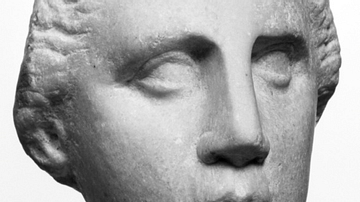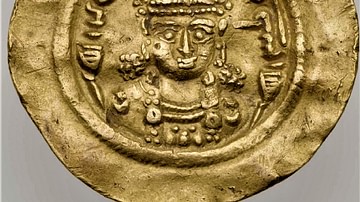Search
Search Results

Definition
Gupta Empire
The Gupta Empire stretched across northern, central and parts of southern India between c. 320 and 550 CE. The period is noted for its achievements in the arts, architecture, sciences, religion, and philosophy. Chandragupta I (320 – 335 CE...

Image
Collection of Ptolemaic Jewellery
This opulent collection of Ptolemaic jewellery from Egypt probably belonged to a wealthy woman and was made between 225–175 BCE. The various pieces were made out of gold and are inlaid with a variety of precious stones. The collection...

Image
Diademed Head of a Ptolemaic King
This marble portrait of a diademed man is believed to depict a Ptolemaic king. The piece is made of marble from Asia Minor and was produced in Alexandria, Egypt. The portrait is part of the collection of the J. Paul Getty Museum. Digital...

Image
Map of the Ptolemaic World
A map showing the known world at the time of the Ptolemaic Empire, ca. 300 BC.

Article
The Extent of the Roman Empire
Time has seen the rise and fall of a number of great empires - the Babylonian, the Assyrian, the Egyptian, and lastly, the Persian. Regardless of the size or skill of their army or the capabilities of their leaders, all of these empires fell...

Definition
Egyptian Empire
The Egyptian Empire rose during the period of the New Kingdom (c. 1570- c. 1069 BCE), when the country reached its height of wealth, international prestige, and military might. The empire stretched from modern-day Syria in the north to modern-day...

Article
Boran & Azarmiduxt: Queens of the Sassanian Empire
Boran (r. 630, 631-632) and Azarmiduxt (r. 630-631) were the only queens of the Sassanian Empire who ruled with the power of absolute monarchs. Daughters of Shahanshah (king of kings) Khosrow II (r. 590-628), Boran and Azarmiduxt, tried to...

Image
Ptolemaic Temple of Kom Ombo
The double entrance to the Temple of Kom Ombo in Aswan, Egypt. Built by the Ptolemaic dynasty c. 180-47 BCE.

Image
Demotic Temple Oath from the Ptolemaic Period
This piece of pottery with Demotic Egyptian text records an oath taken by Petasatet to declare his innocence in the case of cloth theft. This oath was taken before a priest of the Temple of Hathor on Dec. 6, 127 BCE. Temples played an important...

Definition
Ancient Persian Government
The government of ancient Persia was based on an efficient bureaucracy which combined the centralization of power with the decentralization of administration. The Achaemenid Empire (c. 550-330 BCE) founded by Cyrus the Great (r. c. 550-530...